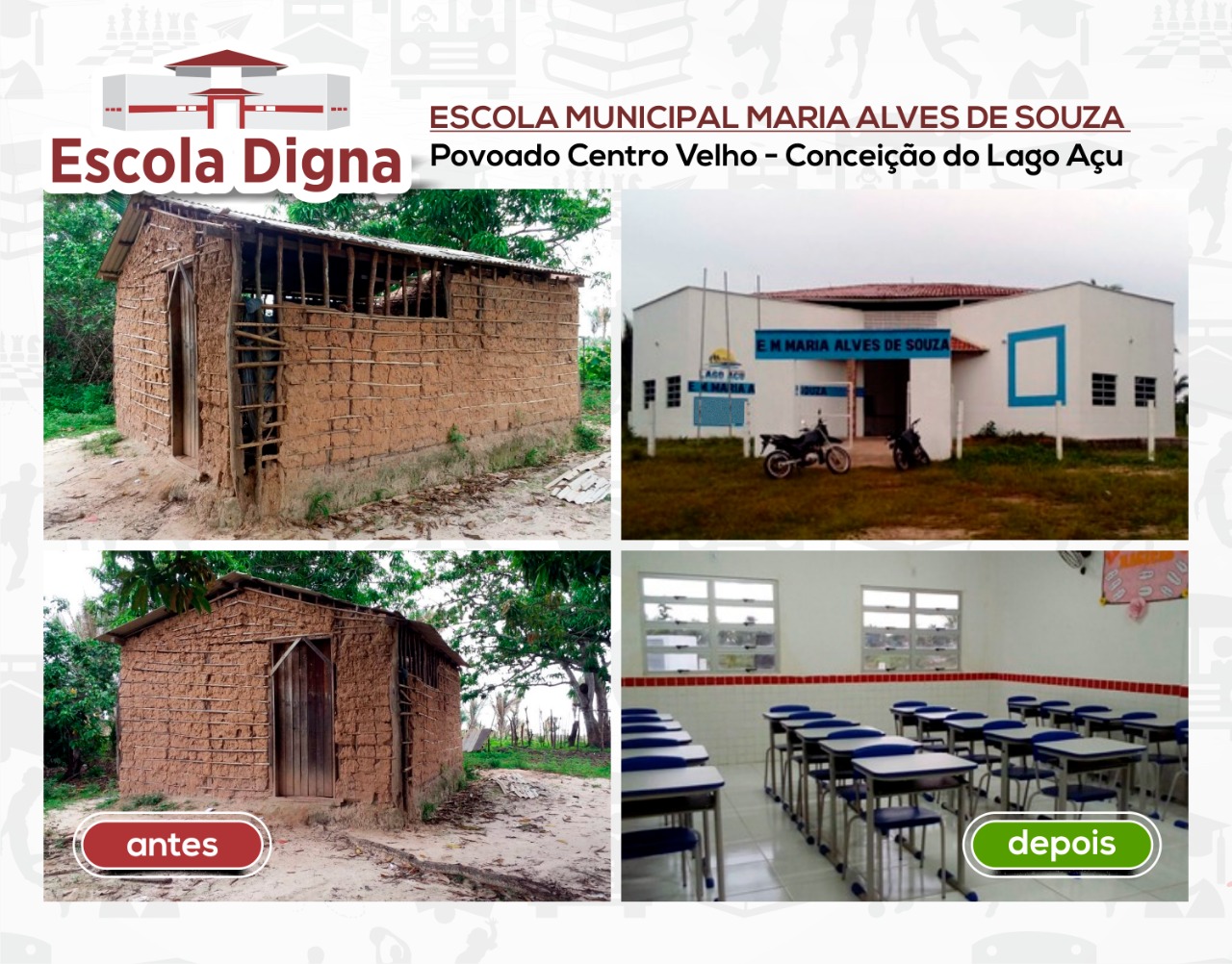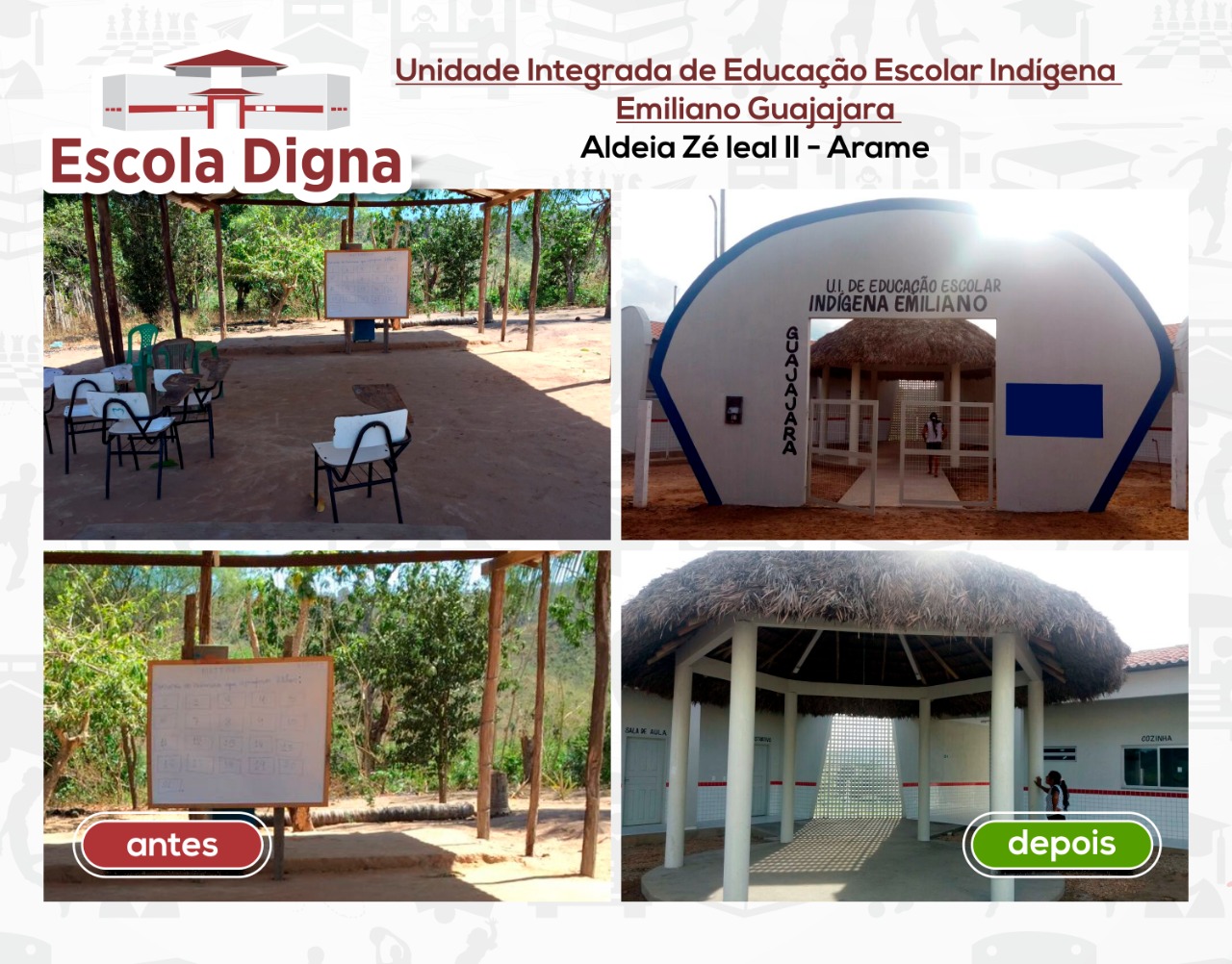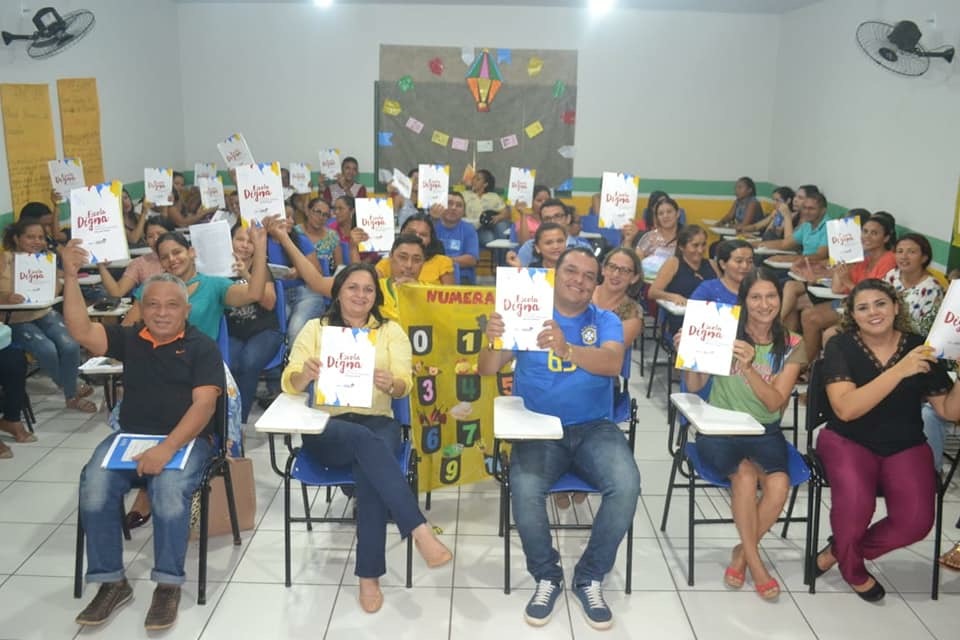“Decent School Program” (Programa Escola Digna): A compromise with the quality Maranhão's public basic education. Linked to the 4th SDG by promoting and ensuring an inclusive and equitable quality education.
Description
Established in 2015, the "Escola Digna" Program is part of the plan "Mais IDH", which consists of a set of strategic actions aiming the reduction of extreme poverty and the promotion of justice and citizenship to all the residents excluded from the social, cultural and political process in Maranhão's territory. The "Escola Digna" programme started by substituting wattle and daub schools for masonry structures, apart from offering technical and pedagogical advice focused on special education, diversity, reading incentives, curriculum development, pedagogical support, school management and learning assessment.
Formulated as an educational macropolicy aiming the institutionalization of structuring elements that subsidize Maranhão's Office of Education actions,<br />
the "Escola Digna" Programme has two main pillars: the collaboration regime, which revolves around the relation between state level and local level government, and the management of the state's network of public basic education. The reason of being of the programme is the belief that ensuring access to a worthy learning and living space that is a school is a pivotal initiative on the full development of citizenship and the battle against social exclusion, thus configuring a strategy that overcomes the inequality of opportunities in the school community, society and the world. <br />
Providing students, teachers and the community a deserving school structure is the first step in that direction, hence the importance of substituting waddle and daub schools for masonry ones. Both pillars are taken into account in this initiative. The collaboration regime is crucial, since it maps and acts as a partner when restoring and revitalizing schools in inappropriate conditions. Also, it expands the access to public education by constructing schools in areas previously ignored. An important aspect of these new structures is their essence in having the students as protagonists and the further expansion of full-time schools.<br />
Offering technical-pedagogical support to local schools networks within the state is also essential to strengthen relations, communication and technical and managerial capacities, fomenting the establishment of an institutionalized network of qualification to all involved actors such as school managers, pedagogical coordinators, teachers and technical teams. This support targets improving the quality of the teaching-learning process and betterment of overall low results in education, and is one of the main courses of action from the collaboration regime.<br />
Another cornerstone of the "Escola Digna" programme is professional appreciation, conducted by offering certified courses, continuing education, fair wages and encouraging self-education.<br />
An important action and challenge that we are still overcoming is qualifying local governments to update and elaborate documents that serve as guidance to the educational policy. Our efforts go to improving the work environment, pedagogical practice and interpersonal relations and is done through the collaboration regime .<br />
Monitoring and evaluation of policies and actions are also one the key elements and objectives of the programme, seeking efficiency, accountability and transparency, but it is still a challenge being dealt with.<br />
The objectives above are all effective responses to some of the SDGs/2030 Agenda, especially number 4, since the "Escola Digna" programme aims to ensure inclusive and equitable quality education and promote lifelong learning opportunities for all. We believe that this project is also indirectly an effective response to other SDGs such as SDG1, SDG3, SDG5, SDG10 and SDG11 since education is one of the biggest factors in reducing inequalities, fighting against prejudice and promoting health. Also, the new structures provide a safer place for students to live and learn.
1. Approval of the Decree 30.620
2. Dissemination of the programme to local governments.
3. Signature of the term of adhesion to the "Escola Digna" programme.
4. Mapping and population study to evaluate the construction of new buildings
5. Determination of the fields of action addressed by the technical-pedagogical assistance
6. Organization of the different teams (training and monitoring)
7. Elaboration of the pedagogical support material
8. Elaboration and reprography of training material / workshops
9. Training and meetings with municipal and regional articulators
10. Elaboration of proposals of training guidelines and selection of materials to subsidize the municipal formations
11. Monitoring and evaluation of the training process and impacts on school spaces.
1. 115 new schools built
2. 30 schools under construction
3. 20 new projects approved and authorized
Technical-pedagogical support:
1. 123 municipalities received pedagogical assistance
2. 28 thousand pedagogical guidance booklets delivered
3. Pedagogical training in school management to 8.809 professionals
4. Pedagogical training in learning assessment to 8.809 professionals
5. Pedagogical training in pre-school to 11.131 professionals
1. Favorable political agenda
2. Term of adhesion to the programme signed by authorities
3. Collaboration Regime
4. Cultural differeces (knowledge exchange)
Constraints:
1. Political resistance by certain local governments
2. Low technical capacity within the state
3. Transportation and mobility (for presencial training)
The local communities are very engaged in the production and maintenance of their schools. Many of them make use of creative solutions to reuse materials to build new environments, furniture etc
The "Escola Digna" programme has its guidance principles very clearly defined. It is based on social inclusion, diversity, an integral and integrated academic formation, democracy and participation, evaluation and assessment on the school environment, compromise with learning and the use of technology and research as basis to learn and teach.<br />
Maranhão is undergoing a massive transformation in education, bringing access to worthy schools, capacitating teachers and aligning political and technical actors towards the same goal, which is provide the best public education with efficiency, accountability and transparency.
http://folhanobre.com.br/2019/02/27/apos-22-anos-professor-troca-colegi…
http://folhanobre.com.br/2019/02/16/governo-do-maranhao-constroi-21-esc…
https://jornalpequeno.com.br/2019/02/09/7-municipios-maranhenses-recebe…
http://www.educacao.ma.gov.br/escola-digna/o-que-e-o-programa-escola-di…
http://www.educacao.ma.gov.br/files/2017/05/apostila-final-produc%CC%A7…
SDGS & Targets
Deliverables & Timeline
Resources mobilized
Partnership Progress
| Name | Description |
|---|
Feedback
Action Network


Timeline
Entity
SDGs
Region
- Latin America and the Caribbean
Geographical coverage
Photos



Website/More information
Countries

Contact Information
Adelaide Diniz Coelho Neta, Advisor
